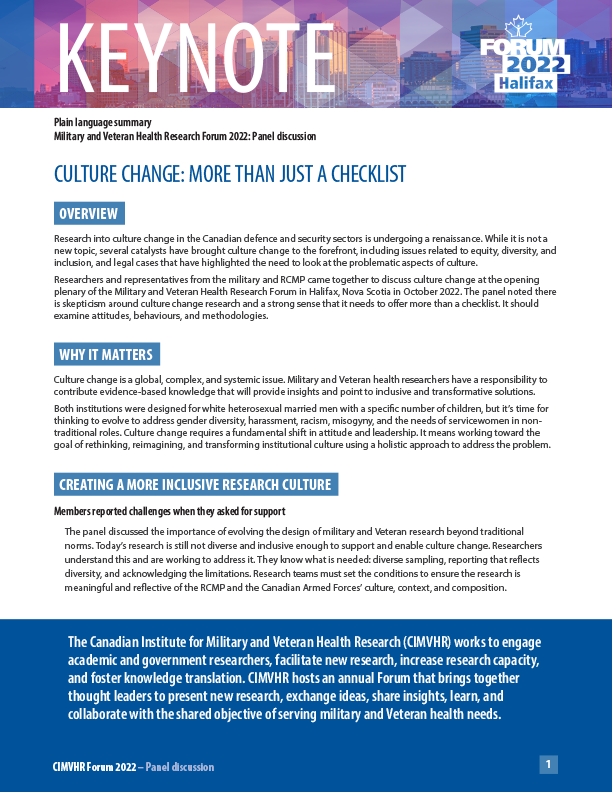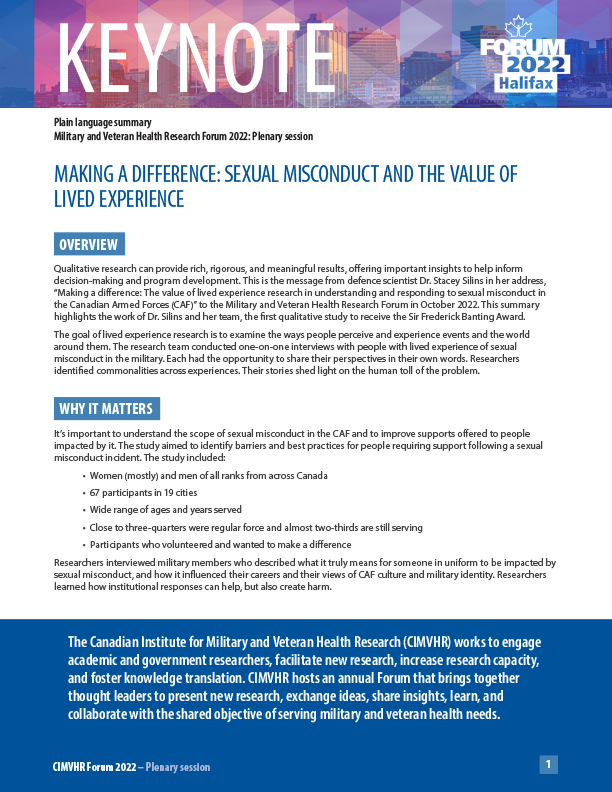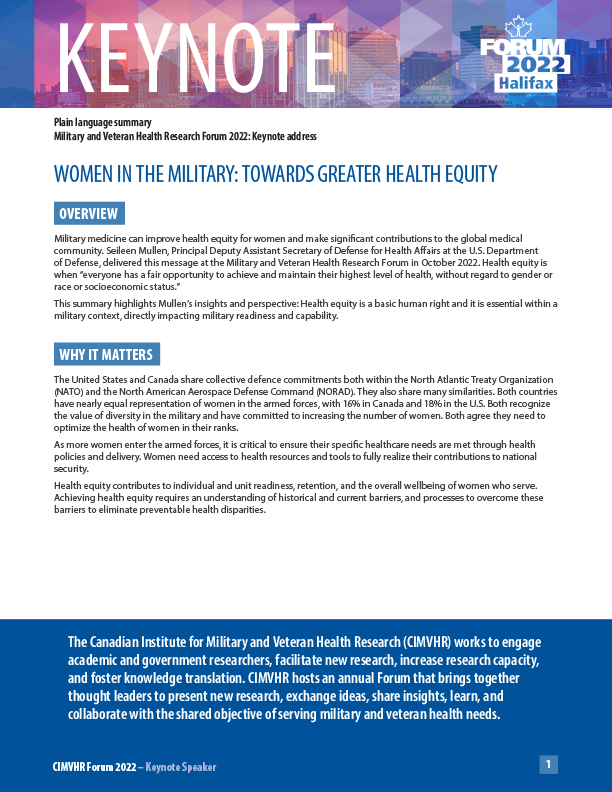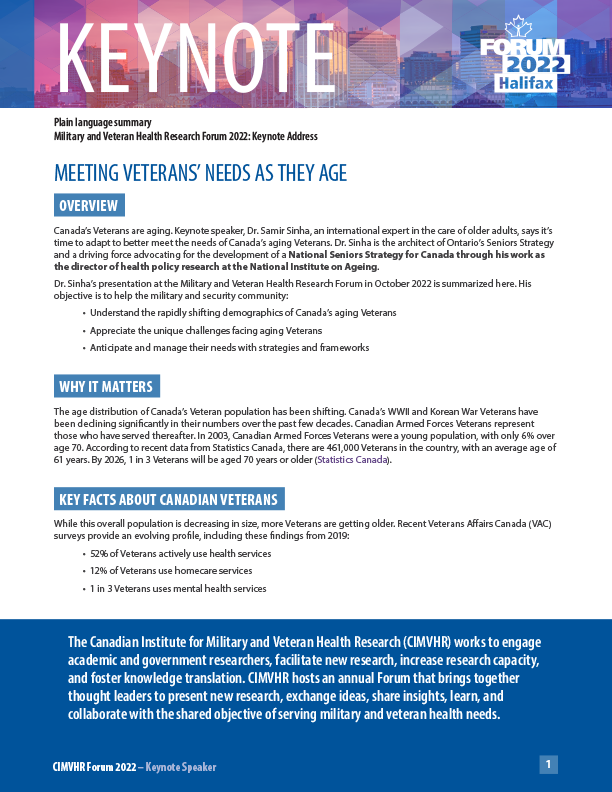CIMVHR Forum 2022 – October 17 to 19 in Halifax, NS
The Canadian Institute for Military and Veteran Health Research (CIMVHR) co-hosted its 12th annual Military and Veteran Health Research Forum in Halifax, Nova Scotia, with Dalhousie University, Mount Saint Vincent University and Saint Mary's University. The sold-out event returned to an in-person format for the first time since 2019, with 550 people in attendance and over 200 research presentations.
New to CIMVHR Forum, the Monday morning started with over 100 delegates participating in the CIMVHR, and Vanier Institute Family Roundtable entitled What about the families? A partnership to enhance services and supports for families of military, veterans, and public safety personnel. Following the early morning session, Forum kicked off with a panel discussion titled Culture Change: More Than Just a Checklist, which was moderated by Col (Retd) Heather Thorne-Albright, a Veteran who served in the forces for more than 39 years. Panellists included: Chief Warrant Officer Bob McCann, Command Chief Warrant Officer, Professional Conduct and Culture, Canadian Armed Forces; Dr. Maya Eichler, Associate Professor, Canada Research Chair, Mount Saint Vincent University; Dr. Karen Davis, Defence Scientist, Director General, Military Personnel Research and Analysis, and Research Lead for the Chief, Professional Conduct and Culture, National Defence Canada; and Vaughn Charlton, Director General, Action Innovation and Modernization, Royal Canadian Mounted Police.
Later that day, the Surgeon General of the Canadian Armed Forces, MGen Marc Bilodeau, introduced the 2021 recipient of the Sir Frederick Banting Award, Dr. Stacey Silins. Dr. Silins is a Defence Scientist with the Director Research Personnel and Family Support, Director General Military Personnel Research and Analysis, Military Personnel Command in the Department of National Defence, who delivered a keynote presentation titled Making a difference: The value of lived experience research in understanding and responding to sexual misconduct in the Canadian Armed Forces (CAF).
On October 18th, the plenary session featured Ms. Seileen Mullen, Acting Assistant Secretary of Defense for Health Affairs within the U.S. Department of Defense. The keynote focused on Women in the Military: Equity and Health Equity.
On the final day of Forum, Mr. Nathan Svenson, Research Director at Veteran Affairs Canada, introduced the final keynote speaker Dr. Samir Sinha, who presented on Addressing our Coming of Age for Canada’s Veterans. Dr. Sinha is a Professor of Medicine at the University of Toronto, the Director of Geriatrics at Sinai Health, and the University Health Network Director of Health Policy Research at the National Institute on Ageing.
In 2016, CIMVHR established a fellowship initiative to recognize leading experts who demonstrate exceptional research advancements in the military, Veteran, and family health and well-being field. This year, CIMVHR appointed one new fellow, Dr. Maya L. Roth, to recognize her outstanding contributions to military, Veteran, and family health research in Canada and leadership within the field.
Additionally, the 2021 fellow, LCol Andrew Beckett, received his CIMVHR coin (since Forum 2021 was held virtually). They join the group of 14 fellows supporting CIMVHR's mission.
 Maya L. Roth, PhD
Maya L. Roth, PhD
2022 Fellow
Clinical Psychologist, St. Joseph’s Operational Stress Injury Clinic – Greater Toronto Site; Associate Member, Yeates School of Graduate Studies, Toronto Metropolitan University; Adjunct Clinical Professor, Department of Psychiatry, Schulich School of Medicine and Dentistry, Western University; and Associate Scientist, Lawson Health Research Institute.
 LCol Andrew Beckett, CD, MD
LCol Andrew Beckett, CD, MD
2021 Fellow
Trauma Advisor to the Surgeon General, Chief of General Surgery, Canadian Armed Forces; Assistant Professor, University of Toronto; Assistant Professor, McGill University; Medical Director, Trauma Program, St. Michael’s Hospital
Annually at the conference, CIMVHR hosts various events to engage emerging researchers and students, including the announcement of the recipients of CIMVHR’s scholarships and awards.
This year the 2022 recipients are:
Wounded Warriors Doctoral Scholarship in Military and Veteran Health Research
A scholarship awarded annually to a PhD candidate who demonstrates excellence in their proposed research while exhibiting significant potential for a high-impact career health research for military members, Veterans or other related populations and their families.
 2022 recipient:
2022 recipient:
Jordana Sommer, PhD (c), University of Manitoba, for the research Protective factors for mental health conditions among survivors of military sexual trauma: A Canadian population-based study.
The Dr. Mark Zamorski Award
Awarded to a post-graduate student to enhance their specialization in epidemiological and mental health problems in military personnel, Veterans, and/or their families.
 2022 recipient:
2022 recipient:
Nabil Ali-Mohamad, BASc, University of British Columbia, for the research Quantifying the prevalence of post-traumatic stress disorder following traumatic blunt or penetrating trauma to the torso area
Royal Canadian Legion Masters Scholarship in Veteran Health Research
An annual entrance scholarship awarded to a master’s level student specializing in research related to Veterans and their families.
 2022 recipient:
2022 recipient:
Martine Southall, BS (Hons), University of Manitoba, for the research Understanding the Relationship between Cannabis Use and Psychotherapeutic Treatment in Canadian Veterans: A Mixed-Methods Study
Welcome Reception
Sunday, October 16th
For the first time, CIMVHR hosted a welcome reception at Forum, allowing participants to reconnect in an informal setting. Held at the Halifax Marriott Waterfront Hotel, the event opened with initial remarks from Dr. David Pedlar and the Hon. Myra Freeman. They welcomed everyone to CIMVHR Forum 2022 and encouraged networking, discussion, and learning over the three days of the conference.
CIMVHR SPEC Networking Event
Monday, October 17th
The Student and Post-doctoral Engagement Committee's (SPEC) annual networking social was held at Garrison Brewery on the Monday night of Forum. This event allows emerging researchers to network and connect with other trainees and post-docs attending the conference. CIMVHR's Assistant Scientific Director Dianne Groll delivered welcome remarks, and SPEC Co-Chairs Ashley Williams and Shannon Hill spoke on behalf of the SPEC Members. The event was sponsored by Canadian Institute for Public Safety Research and Treatment (CIPSRT). Dr. Nick Jones, Executive Director at CIPSRT, offered encouraging words to students in attendance.
Thank you to CIPSRT for sponsoring the event.
Networking Reception
Tuesday, October 18th
The Tuesday night networking reception at the Discovery Centre offered attendees an opportunity to continue networking with colleagues and friends in a social environment. The event had a Nova Scotia theme photo booth, local music, delicious food and hands-on learning activities throughout the venue.
Tuesday, October 18th
Psychedelic Medicine: Definitely Out of the Shadows But Is It Ready for Prime Time?
This workshop investigated the “hot topic” of psychedelic medicine, sharing a brief historic narrative and key touchpoints in the evolution of these treatments and the psychedelic renaissance that has occurred within the past two decades using a “biopharmaceutical approach.” The session concluded with a discussion on current and future use of these approaches and their safety and efficacy.
Fatigue and Moral Injury in People of Service; Identifying and Offering Appropriate Support and Treatment to Active and Retired Members and Families
This session explored effective treatments and support for people in service suffering from fatigue, post-traumatic stress disorder, and undiagnosed moral injury. Presenters described the Ontario Police Association’s Fatigue Management Strategy, which incorporates concepts of proper sleep health, along with moral injury awareness and treatment, and access to the Sleep Disorders Centre when necessary. They also explained how treatment has been linked to a reduction in self-harm and improvement of quality of life in members, and has helped others to access programs to assist personnel and their families.
Role of the Arts in Ill and Injured CAF Members and Veterans' Recovery and Rehabilitation in Canada
Despite scholarly evidence of the positive impact of community-based creative arts, Canada does not yet have a well-developed understanding of the role of the arts in the recovery and rehabilitation of injured or ill service members, Veterans, and their families. In this workshop, facilitators leveraged the findings of academic review and lived experience insights to inform a discussion with community-based evaluators and Veteran artists for recommendations on establishing a framework for community-based arts interventions in Canada.
The Military Sexual Trauma Community of Practice: A Partnership to Promote Understanding, and Decrease the Occurrence and Effects of MST
This workshop provided the opportunity to discuss progress and key accomplishments within the Canadian Military Sexual Trauma (MST) Community of Practice, which was formed after CIMVHR’s first workshop addressing MST at CIMVHR Forum 2019. Applying an intersectional lens to all conversations, facilitators explained the role of community partners and of the MINDS-funded Canadian MST Network, as well as the impact of the first Canadian Virtual Symposium Series on MST, and contributions to the “Critical Conversations” meetings with CAF junior and senior leaders. Progress-to-date on goals identified in 2019 were reviewed and participants worked in breakout groups to identify knowledge gaps, new initiatives, and research topics for the upcoming year.
Wednesday, October 19th
Culture Change Meets Health and Wellness
This session focused on how culture change – a stated key priority of the Canadian Armed Forces – intersects with health and wellness in the military context. Workshop participants heard from academics, military members, military health-care professionals, and civilian health-care professionals working on issues of equity and intersectionality. They identified lessons to be learned about culture change from civilian health care, which has begun to address histories of ableism, colonialism, racism, sexism, and homophobia in its own practices. The workshop also identified best practices for ongoing culture change efforts within Canadian Forces Health Services (CFHS) and Chief Professional Conduct and Culture related to health and wellness.
Creating the Space for Military and Veteran-connected Post-secondary Education in Canada
This workshop focused on generating awareness of educational needs for military members and Veterans, evolving the Canadian Military and Veteran Friendly Campus Consortium (CMVFCC), enhancing equity across the post-secondary landscape, and leveraging expertise of group members for the benefit of those who serve and have served. Participants engaged in small group discussions to co-design a national consortium, co-authored an organizational vision, and co-created best practices, educational interventions and knowledge mobilization strategies that academically and socially support military-connected and Veteran learners.
Equity in Decision Making: The Adjudication of Sexual Dysfunction and Military Sexual Trauma at Veterans Affairs Canada
This discussion highlighted the sex and gender-inclusive approach Veteran Affairs Canada (VAC) is undertaking to ensure equity in Disability Benefits processes for Veterans. Participants learned about the main tools VAC uses to support consistent, transparent, equitable, and timely Disability Benefits decisions; the VAC Entitlement Eligibility Guidelines (EEG) and the Table of Disabilities, and the work underway to modernize these tools by applying a Sex and Gender-Based Analysis Plus (SGBA+) lens. Discussions focused on the importance of providing treatment benefits for sexual dysfunction as part of the overall strategy for supporting Veterans suffering from military sexual trauma.
Harnessing Military and Veteran Data from Census 2021
Drawing from historical records, federal administrative data, and a new military service question on the 2021 short-form census, Statistics Canada now has a database that contains records from more than 2.7 million individuals who served over the past 100 years. This workshop explored the use of census data and the unprecedented opportunity for population health research on the military and Veteran community. It also investigated directions for future large-scale data linkages with federal and provincial administrative data in the health and socio-economic domains.
Charting Your Path Forward: A Mentoring Event for Students and Postdoctoral Fellows
This event provided students and postdoctoral fellows with formal mentoring and networking opportunities, learning and engaging with seasoned researchers in the fields of military, Veteran, and family health, as well as public safety personnel. The event included a panel discussion and a World Café-style session in which participants and panellists had smaller collaborative conversations covering relevant and important questions and topics related to developing a high-impact research career.
Each year at CIMVHR Forum, several researchers are recognized for their significant contributions. This year’s award recipients include:
Banting Award
Awarded annually for military health research and sponsored by the True Patriot Love Foundation. The Banting Award honours Major Sir Frederick Banting – a world renowned physician, Nobel Prize winner and researcher who discovered insulin. The award recognizes high quality Canadian research that addresses military health issues.
 2022 recipient:
2022 recipient:
Chris Edwards, PhD (c), University of Ottawa, for the research Does a History of Childbirth Impact Musculoskeletal Injury in Female Military Members?
Mental Health Research Award, sponsored by Homewood Health
Awarded for the best presentation on improving or innovating clinical mental health practice.
 2022 recipient:
2022 recipient:
Gia (Gaayathri) Geetha, MA, Department of National Defence; University of Ottawa, for the research Evaluation of The Road to Mental Readiness for Canadian Forces Health Services Personnel
Journal of Military, Veteran and Family Health Editors’ Choice Award, sponsored by JMVFH
Awarded to a researcher whose poster presentation at CIMVHR Forum 2022 made an exceptional contribution to military, Veteran, and family health research
 2022 recipient:
2022 recipient:
Rebecca Gomez, MD, Royal Ottawa Mental Health Centre; University of Ottawa, Stellate Ganglion Block for Posttraumatic Stress Disorder in Military Veterans and Royal Canadian Mounted Police: A Case Series
Student Research Award, sponsored by CIMVHR
Awarded to the best student researcher presentation at CIMVHR Forum 2022.
 2022 recipient:
2022 recipient:
Nadine Leduc, MA, Memorial University of Newfoundland, for the research The Impact of Leadership Behaviours on the Mental Well-being of Public Safety Communicators
Russ Mann Award, sponsored by The Vanier Institute of the Family
The Vanier Institute’s Military and Veteran Family Initiative’s Colonel Russell Mann Military, Veteran and Public Safety Families Research Award recognizes high-quality Canadian research that increases understanding of military and Veteran family health. The award is named after Colonel Russell Mann, a recognized national leader and strong voice for military and Veteran families in Canada and a key supporter of the Military and Veteran Family Initiative.
 2022 recipient:
2022 recipient:
Kamaldeep Gill, PhD, Queen’s University, for the research A Systematic Review of Suicidality amongst Military Family Members: Prevalence and Associated Factors
Enhancing Services and Supports for Families of Military, Veterans, and Public Safety Personnel
February 7, 2023
Margaret Campbell, PhD
Each year, the Canadian Institute for Military and Veteran Health Research (CIMVHR) Forum offers participants from academic, government, non-profit, and industry organizations an opportunity to present new research, explore emerging issues, and learn from each other. This year, the Vanier Institute of the Family co-hosted the roundtable with CIMVHR at their 12th annual Forum in Halifax, Nova Scotia.
The purpose of the roundtable was twofold. First, it aimed to stimulate conversations about the unique needs and strengths of military, Veteran, and public safety personnel (MVPSP) families. Second, it explored how MVPSP families can benefit from and inform the direction of the ongoing Families Matter Partnership Development project.
Since 2021, the Vanier Institute has partnered with Dr. Heidi Cramm (PhD) of the School of Rehabilitation Therapy at Queen’s University, CIMVHR, and the Canadian Institute for Public Safety Research and Treatment (CIPSRT) on the Families Matter Partnership Development project. Funded by the Social Sciences and Humanities Research Council of Canada (SSHRC) through its Partnership Development Grant, this initiative is focused on developing research and training opportunities in Canada that support family research focusing on occupational risk and requirements.
The roundtable was an important step in helping to ensure that the Families Matter Partnership is relevant to the lives of MVPSP families, which are a diverse and often overlooked population. Many people with different backgrounds attended, including members of the Canadian Forces Morale and Wellness Services, Canadian Armed Forces, CIPSRT, Military Family Resource Centres, and Wounded Warriors Canada. Around 100 individuals took part in discussions led by experts in military and Veteran families to address the following questions:
- What are some of the unique characteristics of military, Veteran, and public safety personnel (MVPSP) families?
- What does it mean to live with and navigate the challenges faced by MVPSP personnel and their families?
- What are some of the consequences when these needs are not met?
- How do organizations or systems (e.g., educational systems, healthcare systems) respond to these needs?
- What do military, Veteran, and public safety personnel families need from the Families Matter partnership?
- How do we collectively envision a partnership that is designed to meet these needs?
- When you think about a partnership that supports knowledge mobilization for MVPSP families and those who work with them, how would you complete the phrase “Wouldn’t it be great if…”?
The roundtable identified several key issues:
Family identity and structure are influenced by occupational risks and requirements
Participants shared that MVPSP families navigate a range of challenges that stem from occupational risks and requirements associated with the sector in which the serving family member works. These risks and requirements flow into the family unit and can influence family identity, structure, and wellbeing.
The unique and diverse needs of MVPSP families are often unmet
MVPSP families have unique needs, but these families experience a range of barriers when attempting to access supports that would help address their needs. Support services available to MVPSP families are lacking. Not only do these families need help identifying and accessing existing support, but these supports must be accessible, plentiful, inclusive, and designed to fit the unique needs of MVPSP families. Similarly, they should be delivered by professionals who are prepared to work with people from a diverse range of cultures and backgrounds. Lastly, these supports should be delivered by professionals who are understanding of the different ways that trauma can impact an individual’s life and wellbeing.
Certain MVPSP families (e.g., single-income families, divorced families, racialized families) are the most underserved. There is a lack of resources and supports designed to fit the unique needs of MVPSP families who are vulnerable to racism, income inequality, sexism, and other forms of inequality.
The Families Matter Partnership must be informed by and fit the needs of MVPSP families
The Families Matter Partnership should offer MVPSP families resources, results, and a network. Additionally, the partnership should offer MVPSP families a concrete role within the partnership and help amplify their voices so that more people are aware of their experiences, complexities, and contributions.
Learn more about the 2022 CIMVHR Forum
Learn more about the Families Matter Partnership
Margaret Campbell, PhD, is a postdoctoral fellow with the School of Rehabilitation Therapy at Queen’s University and the Vanier Institute of the Family. Her research focus is on the relationships between disability and family wellbeing, and she is currently developing a Family Science curriculum for those studying the families of military, Veteran, and public safety personnel.








